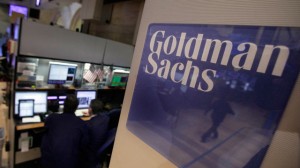Simon Johnson is the Ronald A. Kurtz (1954) Professor of Entrepreneurship at MIT’s Sloan School of Management. He is also a senior fellow at the Peterson Institute for International Economics in Washington, D.C.; co-founder of The Baseline Scenario, a blog covering the global economic and financial crisis; and a contributor to Economix, a New York Times blog. He last appeared on the Journal in 2010 with James Kwak to talk about their book, 13 Bankers: The Wall Street Takeover And The Next Financial Meltdown, and Congress’ plans to reform Wall Street after the financial meltdown.
We caught up with Johnson this weekend to find out how those reforms are progressing and to discuss last week’s financial news, including the results of the Federal Reserve’s stress tests, in which 4 of the nation’s 19 banks failed, the ongoing saga of the much commented upon Volcker Rule, and a certain resignation letter you may have heard about.
Theresa Riley: What’s your take on the Fed bank stress test results released last Wednesday?
Simon Johnson: The stress tests are weak — the Fed did not consider the serious downside of a major sovereign crisis in Europe. In effect, the Fed did what it could to allow big banks to pay dividends and reduce their equity levels. This is reckless and irresponsible policy.
Riley: What information do we still need to determine whether the biggest U.S. banks would remain solvent if another financial crisis hits?
Johnson: Stress tests only work if you seriously consider the very bad things that can happen to the global economy. The Fed is incapable of doing this — they always wear rose-tinted glasses. We should require banks to be highly capitalized in order to have adequate buffers against losses that may occur.
[Economist] Anat Admati of Stanford University and her colleagues have shown that, from a social point of view, our banks should be financed with much more equity relative to debt.
Only bankers have an interest in running their banks with little equity and a lot of debt. Quite why the Federal Reserve would facilitate them in this highly risky course of action is a mystery.

Traders work in the Goldman Sachs booth on the floor of the New York Stock Exchange Thursday, March 15, 2012. Greg Smith, an executive director at Goldman Sachs, resigned with a blistering public essay that accused the bank of losing its "moral fiber," putting profits ahead of customers' interests and dismissing customers as "muppets." (AP Photo/Richard Drew)
Riley: Any reaction to the Goldman executive resignation letter that appeared in the Times last week? Some have said that it helps make the case for the Volcker Rule. What do you think?
Johnson: Greg Smith’s resignation letter made it clear that the culture in big Wall Street banks remains just as bad as ever — traders and executives have no respect for their clients and are mostly looking for ways to behave badly (and get away with it).
This absolutely strengthens the case for the Volcker Rule — which is a serious attempt to limit the damage that big banks can do to the economy.
Riley: What is the Volcker Rule? How does it relate to the idea of banks being “too big to fail”?
Johnson: The Volcker Rule attempts to limit the extent of “proprietary trading” by big banks. This trading is a form of gambling that creates huge risks. When the traders in question get lucky, they get the upside. When things go badly, the losses are handed to the government through various forms of downside protection.
“Heads, I win; tails, you lose” is not a good way for the financial system to operate. The Volcker Rule is a small but significant step towards making the system safer.
Riley: The Volcker Rule has been compared to, and contrasted with, the Glass–Steagall Act of 1933. What are the similarities and differences?
Johnson: Glass-Steagall effectively separated commercial banking (lending to people and companies) from investment banking (arranging the sale of securities and trading those securities). The Volcker Rule does not break up banks and does not restore Glass-Steagall. But, if properly implemented, it would limit the ability of big banks to gamble in a reckless fashion.
Riley: Why are bankers so opposed to the Volcker Rule?
Johnson: Top people at megabanks make a lot of money under existing arrangements. They get the upside from big bets and, when things go badly, they benefit from downside protection provided by the government. This amounts to a non-transparent, unfair and dangerous subsidy system. The Volcker Rule will curtail subsidies and cut bankers’ pay.
Riley: In a recent editorial in the Financial Times, Paul Volcker wrote about the 16,488 comments filed about his Rule, including a number of critical comments from foreign officials: “I regret that the effect, if not the intent, of much of the lobbying has been to add complications rather than to clarify the principles involved.” Are you also concerned that the proposed changes may weaken the Volcker Rule?
Johnson: There has been a huge lobbying effort against the Volcker Rule. It has been greatly weakened as a result. There are still some meaningful teeth remaining but now the pressure increases even further. If the regulators cave in to current industry demands, the Rule will become effectively toothless.
Riley: What’s your advice to ordinary people wondering where to put their money? And is there any action you would advise people take to help make banks more accountable?
Johnson: You should be careful with your investments and be very skeptical of the advice you receive from big banks. Trust community savings banks and credit unions. Trust the FDIC to protect your deposits. Support politicians who want to reform and rein in the power of the big banks.


